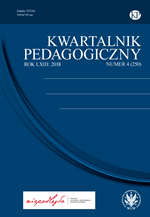Świadek historii... w stulecie odzyskania Niepodległości... – z Ireną Wojnar rozmawia Adam Fijałkowski („Kwartalnik Pedagogiczny”)
The witness of history ... on the 100th anniversary of the Polish Independence. Adam Fijałkowski (“The Pedagogical Quarterly”) talks with Irena Wojnar
Author(s): Irena Wojnar, Adam FijałkowskiSubject(s): Social Sciences, Education
Published by: Wydawnictwa Uniwersytetu Warszawskiego
Keywords: History of Poland 1918–2018; University of Warsaw; Polish pedagogy 1918–2018; school books; humanistic pedagog
Summary/Abstract: Editor in Chief of “The Pedagogical Quarterly” discourses with Irena Wojnar, employed at the University of Warsaw since early post-war time. Her intellectual evolution (l’âge où l’on grandit) occurs in changing dramatic periods of our history, optimism of elementary school before the World War II, painful time of clandestine education during the Nazi occupation in Warsaw, hopes and illusions of the post-war epoch. In these periods, the essential inspirations for Irena Wojnar were successive books of Bogdan Suchodolski, with symbolic titles: Love life – be valiant (2nd ed. 1930), Whence and where are we going to? (1943) and Education for the future (1947). In the Polish school before the WWII, pupils were educated in the spirit of patriotism and civic duties, sensibility to the surrounding world and the service of humans. Tragic heroism of the WWII became the proof of those values. In the conditions of constant aggressive and permanent threat, quasi “against the night”, the fight with the occupant becomes the essential moral duty. For young people, pupils and students, when secondary and tertiary schools were closed by the Nazis, this duty signified participation in clandestine education supporting hope to preserve future order in the world and preparation of the future activity in the free Poland after the WWII. The end of the WWII created a chance for the future shape of the world in line with our humanistic values. It was the period of the reconstruction of Warsaw, destroyed during the WWII, becoming a city of “sorrow and dreams”. In the final part of the conversation there appears the general opinion that every individual life–story, beyond its individual aspects, reveals a more general educational idea. Human life runs across destiny and personal consciousness. Independently of our destiny, we have a chance to choose values important for us, to realise the “poetics of the self” (poétique du soi) based on our capacity to overcome own limitations and to increase goodness in the world.
Journal: Kwartalnik Pedagogiczny
- Issue Year: 250/2018
- Issue No: 4
- Page Range: 289-302
- Page Count: 14
- Language: Polish
- Content File-PDF

